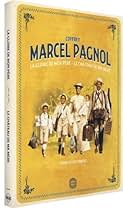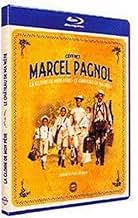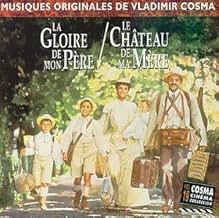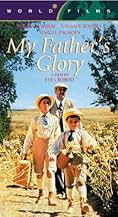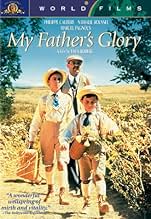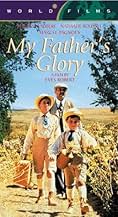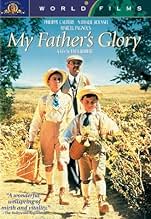Aggiungi una trama nella tua linguaAt the end of the nineteenth century, little Marcel lives with his parents in the Provence countryside. During his holiday, Marcel meets Lili, a local boy who knows all the secrets of the hi... Leggi tuttoAt the end of the nineteenth century, little Marcel lives with his parents in the Provence countryside. During his holiday, Marcel meets Lili, a local boy who knows all the secrets of the hills, and the two become fast friends.At the end of the nineteenth century, little Marcel lives with his parents in the Provence countryside. During his holiday, Marcel meets Lili, a local boy who knows all the secrets of the hills, and the two become fast friends.
- Regia
- Sceneggiatura
- Star
- Premi
- 2 vittorie e 5 candidature totali
Recensioni in evidenza
In a documentary style the older son Marcel relates how his father Joseph a schoolteacher takes up positions in various parts of France and how before school-going age he sits at the back of the class and quickly learns how to read the text on the blackboard. Family life seems to revolve around teaching and the classroom until Aunt Rose meets Jules on a park seat and eventually marries him. After Jules joins the family circle father learns that there are more things in life than the educational system.
When the family rents a villa in a wild part of Provence, Jules instructs father on the use of the gun and they go on hunting sprees together. On one of these expeditions the son gets lost and meets up with a local boy about his own age. From him he learns about local birds, the eagles, the owls and scary stories about how these wild birds go for the eyes of their prey. This escape into the wild is a charming part of the family's life story and the final parting between the two boys when the family finally leaves is indeed moving.
The story is sprinkled with amusing incidents. For most boys the birth of a child is nothing short of a miracle. They conjecture that the navel is a kind of button which can be unbuttoned to let the baby out. And when father learns to shoot, Jules attaches a target to the outside toilet door. Father is delighted when he gets a bull's eye and Jules does well too. Not so the maid who happens to be inside the toilet at the time. Fortunately she emerges shaken but unharmed.
The film covers so much of French life. It is amazing how much is packed in. The story unfolds at an easy pace with beautiful music that never intrudes and scenery that astounds. I can recommend this little masterpiece about how wonderful family life can be.
This is a film I saw for the first time about 10 years ago. 10 years later, I enjoyed it even more. Yves Robert makes you care for characters. Philippe Caubère is brilliant as the father, who's a teacher. The truly beautiful Nathalie Roussel: the caring mother and wife. Young Julien Ciamaca gives a strong performance as Marcel. And what about Didier Pain: I just love his way of playing Oncle Jules.
Perhaps the greatest accomplishment of this movie is to make you travel to this part of the world, to make you feel that you're there when the story unfolds.
87/100 (***½)
Seen at home, in Toronto, on June 16th, 2002.
The father is a school teacher, an atheist, and a republican. But he is a loving husband and a great father to his children. The mother is shy and affectionate and is sensitive the needs of her husband and children. So what makes this film such an enchanting experience? Since I am not a writer, I cannot really put into words the way I felt after watching this film. I know it left a smile in my heart...it also made me nostalgic for it reminded me of my own childhood. I wanted it to go on long after the movie ended. Watch it and you will know what I mean. It will take you back to the magical moments of growing up.
It is a loving, romanticized recreation of Pagnol's childhood trips to the south of France.
Director Yves Robert ices every scene with sweet affection and a seemingly effortless attention to detail.
There are so many moving, heart-tugging scenes.
Describing them all would spoil the confection.
I'll mention one. Young Marcel accompanies his father, Joseph, a school teacher, to school one day. Not believing that Marcel can read already, Joseph writes a simple declaration of his love for Marcel on the blackboard. Marcel then surprises his father by reading out loud what his father wrote. It is such a touching, affecting scene.
MY FATHER'S GLORY is bursting to the seams with such magic.
Vladimir Cosma's score perfectly captures the period and tone of Pagnol's memories.
Simply exquisite.
Lo sapevi?
- Quiz'La Gloire de mon père', published in France in 1957, is the first volume of four autobiographical novels by Marcel Pagnol. The second volume, 'Le château de ma mere', was published in 1958. In the novels, Marcel's meeting Lili takes place in volume two, as does Marcel's decision to stay at Provence as a hermit. The two novels were translated into English and published by Doubleday (in the U.S) as a single book in 1960 under the title 'The Days Were Too Short', This translation was reprinted by North Point Press as a single book titled 'My Father's Glory / and / My Mother's Castle' in 1986.
- BlooperOn the family's holiday, each time that it is raining the sky is bright and without a cloud (except the scene with the storm).
- Citazioni
Augustine: You need your gun to go shopping?
Joseph Pagnol: You never know.
I più visti
- How long is My Father's Glory?Powered by Alexa
Dettagli
- Data di uscita
- Paese di origine
- Lingue
- Celebre anche come
- My Father's Glory
- Luoghi delle riprese
- Signes, Var, Francia(bird hunting party)
- Aziende produttrici
- Vedi altri crediti dell’azienda su IMDbPro
Botteghino
- Lordo Stati Uniti e Canada
- 1.730.856 USD
- Lordo in tutto il mondo
- 1.730.856 USD
- Tempo di esecuzione1 ora 45 minuti
- Colore
- Proporzioni
- 1.85 : 1

![Guarda Bande-annonce [OV]](https://m.media-amazon.com/images/M/MV5BNjNlYzQ0NGQtODdlNS00YzRmLTlhYzQtZDdiOTNiZDZlYWYzXkEyXkFqcGdeQXRyYW5zY29kZS13b3JrZmxvdw@@._V1_QL75_UX500_CR0)

